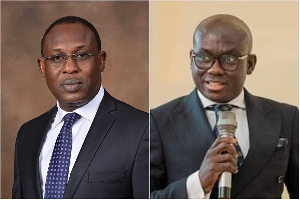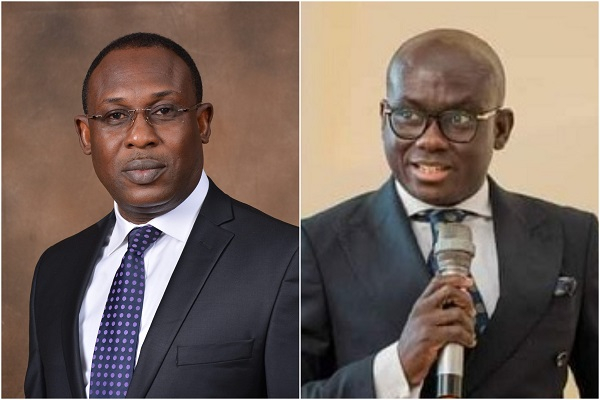 A photo collage of IMANI Veep Kofi Bentil (left) and former Attorney General Godfred Dame
A photo collage of IMANI Veep Kofi Bentil (left) and former Attorney General Godfred Dame
Vice President of IMANI Africa, Kofi Bentil, has clarified recent comments he made about former Attorney General and Minister of Justice, Godfred Dame, and the National Cathedral project.
In an earlier report published by GhanaWeb on July 20, 2025, Bentil was quoted as accusing the former Attorney General of misleading the Supreme Court regarding the use of public funds for the National Cathedral project while making his submission on the July 19, 2025, edition of News File on Accra-based JoyNews.
However, in a Facebook post dated July 22, 2025, Bentil described the report as “misleading,” stating that it captured only a portion of his remarks made on Joy News’ Newsfile and failed to include corrections he made later in the same programme.
Bentil reaffirmed his strong opposition to the National Cathedral project, calling it “a patently bad idea,” and maintained that the Akufo-Addo’s government’s claim that no public funds would be used in its construction was false.
He also clarified that this was the central focus of his argument, not a direct accusation that Attorney General Godfred Yeboah Dame had lied to the Supreme Court.
“The point I intended to convey was that all statements that the government was not funding the project were wrong. That said, it is important to state the correct facts, which is why I made the corrections on air,” Bentil explained.
He went on to list some key factual clarifications contrary to his earlier claims on live television, as follows:
1. The current Chief Justice, Gertrude Araba Esaba Torkornoo was not a member of the panel which adjudicated the National Cathedral case filed by Dr. James Kwabena Bomfeh. In fact, she had not even been appointed to the Supreme Court as of the date of the judgment – 23rd January, 2019.
2. The Attorney-General of the day was Madam Gloria Akuffo and not Mr. Godfred Yeboah Dame. Mr. Dame was a Deputy Attorney-General, even though he was counsel on record in that case.
3. The questions that came before the Supreme Court for determination in the National Cathedral Case were (1) whether it was constitutional for the State to provide assistance for Muslims to perform the Hajj pilgrimage and to allocate land for the building of a national cathedral, and (2) whether the acts of the State in supporting the Hajj pilgrimage and allocating land for a cathedral amounted to “excessive entanglement of the State in religion” and therefore, unconstitutional.
4. The Supreme Court per Sophia Adinyira JSC, held that while the Constitution prescribed that Ghana was a secular state, “it affirms and maintains the historical, cultural, and religious character of the Ghanaian society. Secularism in the context of the Constitution must be understood to allow, and even encourage state recognition and accommodation of religion and religious identity. The Constitution does not prohibit the Government from supporting, assisting or cooperating with religious groups.”
5. My information is that, at the time, the National Cathedral Case filed by James Kwabena Bomfeh and argued in 2018, leading to judgment delivered by the Supreme Court in January 2019, the actual construction of the Cathedral had not commenced. The question of whether it was constitutional for the State to spend the colossal amounts of money it subsequently did on the construction, which I still believe was excessive, therefore did not arise for determination in that case.
ID/MA
Meanwhile, you can also watch videos from the NPP’s National Delegates Conference below:
Watch the latest episode of Health Focus below:


